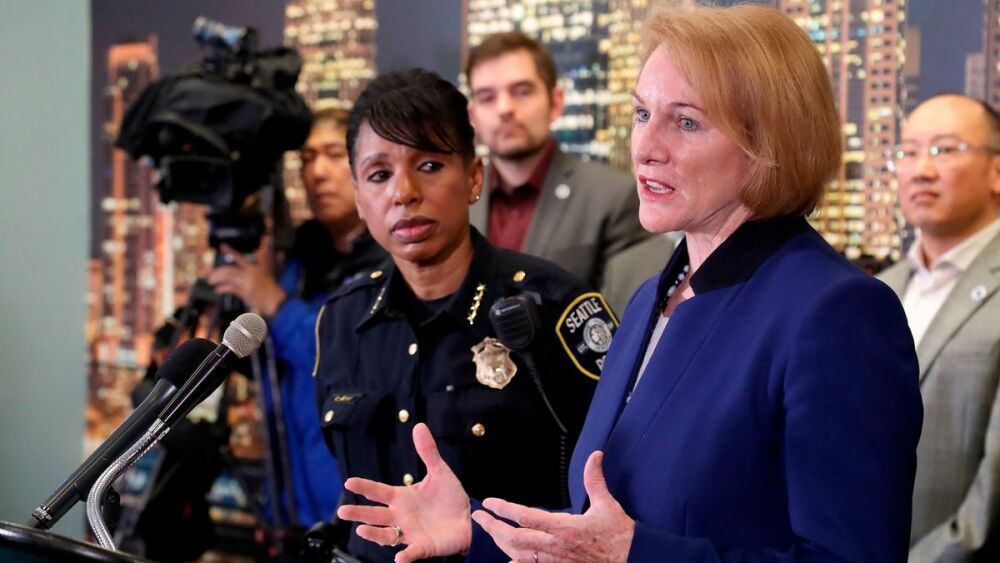The Seattle Times
By Daniel Beekman
SEATTLE — Due to the novel coronavirus pandemic, Seattle Mayor Jenny Durkan has signed an emergency order temporarily halting residential evictions for non-payment of rent, her office said Saturday, outlining how the moratorium will work.
As the coronavirus has spread, tenant advocates have called for evictions to be suspended, saying hearings are causing at-risk people to venture into public spaces or lose their cases by not showing up. They’ve said more people are going to be struggling with rent payments soon, because the outbreak has caused so many businesses to close and cut back on staff.
Durkan’s order will be sent to the City Council for ratification, modification or rejection, but the moratorium will be in effect in the meantime. The council is very likely to support the moratorium, possibly with some adjustments. Citywide Councilmembers M. Lorena González and Teresa Mosqueda issued statements backing the move, and Councilmember Kshama Sawant urged a moratorium earlier in the week.
The mayor initially announced the step in a news release Friday reacting to President Donald Trump’s declaration of a national emergency, indicating the federal declaration would pave the way for her to take more aggressive measures in Seattle.
I will be taking additional actions in the coming days focused on more relief for our workers and individuals hardest hit by this emergency,” Durkan said in a statement. “We cannot let individuals lose their homes or go hungry at this critical time.”
The mayor’s office shared details Saturday about the evictions moratorium. It is effective immediately and will last for 30 days or until Seattle’s coronavirus emergency ends, pending the council’s approval. Durkan declared an emergency in the city earlier this month.
The mayor’s order applies only to residential evictions, not commercial evictions, and only to cases involving non-payment of rent, not other causes for eviction.
The order says landlords may not issue termination (pay-or-vacate) notices for non-payment of rent, may not initiate eviction actions in court and may not advance termination notices already posted. For existing eviction cases, Durkan’s order should be a defense in court. In cases where a tenant doesn’t appear for a hearing, the court may postpone the case to a later date.
Tenants must continue making rent payments, to the extent they can, the mayor’s office said, and those struggling with money should work with their landlords on payment plans. But Durkan’s order prohibits late fees and other charges for late rent payments.
For tenants unable to pay rent during the moratorium, landlords may send billing statements or letters documenting what money is owed.
Durkan’s order cites her emergency powers, saying they authorize “extraordinary measures to protect the public peace, safety and welfare.” It also cites the city’s police and regulatory powers under the state constitution.
The order says the evictions moratorium “will protect the public health, safety, and welfare by reducing the number of individuals and families entering into homelessness during this epidemic, which means lowering the number of people who may develop the disease or spread the disease.”
In the past two weeks, “there has been a significant 50% drop in the number of tenants appearing in court for their eviction hearings in King County, resulting in default judgments being entered and tenants losing substantial rights to assert defenses or access legal and economic assistance,” the order says.
We have entered an unprecedented era for our city. Too many families are already struggling, and (the coronavirus) has disproportionately affected the communities who can least afford it,” Durkan said Saturday in a statement after signing the evictions order.
“While the city will need significant state and federal resources to handle the long-term impacts of the crisis, we are charting the course for the rest of the country, and Seattle must set the example by reducing the financial hardship for workers impacted by this pandemic.”
The Rental Housing Association of Washington (RHAWA) and the Washington Multi-Family Housing Association (WMFHA) didn’t immediate comment on the mayor’s order. The landlord groups this week recommended that their members hold off on asking the Sheriff’s Office to enforce evictions in King County. The groups said they wanted eviction filings to continue; the court proceedings can unlock access to certain rent assistance programs, they said.
The Durkan administration is exploring options to provide more rent assistance to low-income tenants and to support landlords who may be financially impacted by reduced rental income, her office said. Durkan didn’t immediately address homeowner mortgage-payment concerns.
A number of Washington labor and community organizations began calling for a moratorium on residential eviction filings and enforcements last weekend. Sawant requested the same, along with a moratorium on commercial evictions and a ban on coronavirus-related residential foreclosures, sponsoring a petition that she said drew several thousand signatures.
In a news release Friday, Washington Community Action Network asked all Washington courts to suspend evictions, noting some people who are evicted become homeless. Multiple other states have suspended evictions, the organization said.
It is absolutely appalling that our court system is putting lives at risk during this outbreak,” the release said. “Pushing a renter into homelessness during a pandemic, isn’t just a health risk to the individual, but to the entire community around them.”
The Washington state Supreme Court hasn’t issued a statewide order related to evictions during the pandemic, spokeswoman Wendy Ferrell said in an email. But an order issued by Chief Justice Debra Stephens last week has given local courts the ability to take emergency steps, Ferrell said.
(c)2020 The Seattle Times












